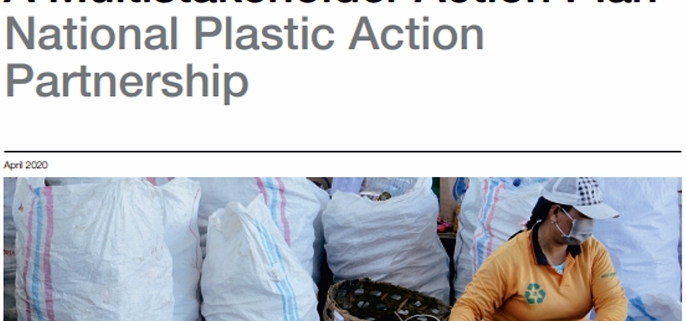Indonesia’s Multistakeholder Action Plan
In April this year the national strategy document “Radically Reducing Plastic Pollution in Indonesia: A Multistakeholder Action Plan” was published.
As reported by World Economic Forum, the plan lays out an evidence-based roadmap towards reducing the amount of plastic leakage into the country’s coastal waters by 70 percent by 2025, as well as achieving near-zero plastic pollution by 2040 through transitioning to a circular economy for plastics.
“Indonesia’s unprecedented national effort to take on plastic pollution is crossing a new frontier in what is possible”, Luhut Binsar Pandjaitan, Coordinating Minister for Maritime Affairs and Investment, wrote in the preface to the document. “Working from the basis of a radical idea, we have created a platform – the Indonesia National Plastic Action Partnership (NPAP) – to mobilize willpower from all sectors and identify a clear path towards our goal to show that plastic pollution is not too complex or too enormous a challenge to overcome.” In this context, he invites “all to join us on this journey. As Indonesia puts this plan into action, we look forward to sharing our knowledge and to learning from others on bringing solutions and successes to scale”.
As reported, urgent action is needed to turn the tide of plastic waste and pollution in Indonesia. 70 percent of the country’s plastic waste – an estimated 4.8 million tons per year – is considered mismanaged in ways such as being openly burned (48 percent), dumped on land or in poorly managed official dumpsites (13 percent) or leaking into waterways and the ocean (9 percent or 620,000 tons). Despite a sharp growth in foreign waste imports in 2018, more than 95 percent of plastic pollution comes from waste generated within Indonesia, the analysis said. The situation is expected to worsen in the next years.
Needed: action and investments
According to the information, the Action Plan compares two possible outcomes for the Republic of Indonesia: one is the “business as usual” scenario, in which plastic pollution is projected to increase by one-third to 6.1 million tons in 2025 and more than double by 2040, even if the plastic waste collection rates keep pace with a growing waste generation. The other is the System Change Scenario (SCS), which would enact a series of ambitious, society-wide transformations, including the following five key interventions:
- Reducing or substituting avoidable plastic usage to prevent the consumption of more than one million tons of plastics per year by switching to reuse and new delivery models, changing behaviors and replacing plastics with alternative materials that yield improved environmental outcomes.
- Redesigning plastic products and packaging with reuse or recycling in mind.
- Doubling plastic waste collection from 39 to more than 80 percent by 2025 by boosting state-funded and informal or private-sector collection systems; this implies expanding plastic waste collection to four million new households each year until 2025.
- Doubling current recycling capacity by building or expanding plastic sorting and recycling facilities to process an additional 975,000 tons of plastics per year. To achieve that by 2025, large-scale recycling hubs need to be strengthened in Java and developed in urban centers outside of Java.
- Building or expanding controlled waste disposal facilities to safely manage non-recyclable plastic waste.
The reduction of plastics in the ocean until 2025 would require a total capital investment of 5.1 billion US-Dollar and an operational funding budget of 1.1 billion US-Dollar/year in 2025 to run an effective waste management and recycling system, the strategy document said. Under the System Change Scenario, Indonesia is expected to prevent 16 million tons of plastics entering its coastal waters, create more than 150,000 jobs and significantly improve public health outcomes.
(GR22020, Page 8, Source: World Economic Forum)







